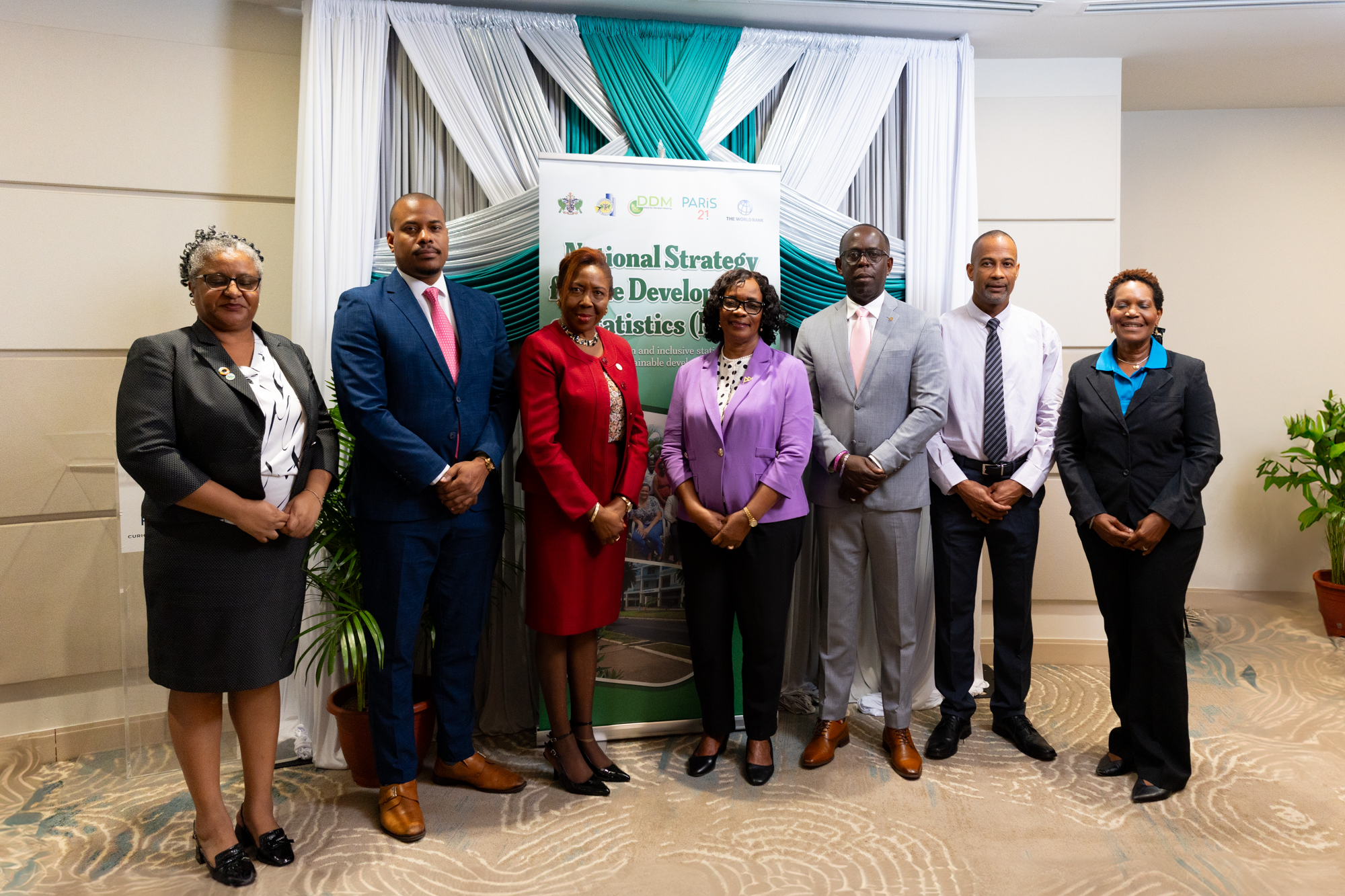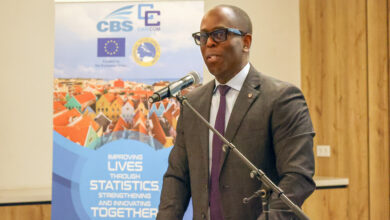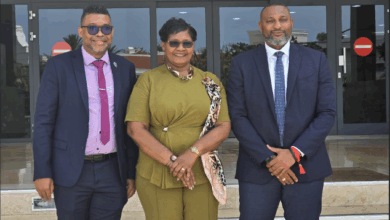Saint Lucia has launched its National Strategy for the Development of Statistics (NSDS), marking a significant milestone in the Caribbean Community’s collective pursuit of evidence-based decision-making and sustainable development.
CARICOM Deputy Secretary-General, Dr. Armstrong Alexis, participated in the launch in Castries on 23 September 2025, hailing it as not just a national achievement, but “a regional one that contributes to the broader goal of ensuring CARICOM remains resilient and responsive to the needs of our people.”
“There is great value in this regional approach to statistical development, especially for regional integration and particularly in the pursuit of our shared priorities, for example, addressing the climate crisis, ensuring food and nutrition security and fostering digital growth and transformation,” the Deputy Secretary-General said.
He added that the CARICOM Secretariat stands ready to assist Saint Lucia in the full implementation of its NSDS, and in ensuring that it remains consistent with the CARICOM Regional Strategy for the Development of Statistics (RSDS).
Please read his remarks below:
It is both and honour and privilege to address you this morning on the occasion of the launch of your National Strategy for the Development of Statistics (NSDS). This moment marks a significant milestone in our collective pursuit of evidence-based decision-making and sustainable development across the Caribbean Community.
The mandate to develop a CARICOM Regional Strategy for the Development of Statistics (RSDS) and National Strategies for the Development of Statistics (NSDS) dates back to the Eighth Meeting of the CARICOM Community Council in 2001. At that meeting, the Council noted the need for a strategic approach to the development of statistics in CARICOM. This included efforts to harmonise statistics across the region, document statistical methodologies and data collection processes, and establish a core set of socio-economic statistics to effectively depict the socio-economic status of CARICOM Member States.
In 2005, during the Fifteenth Meeting of the Community Council, it was recommended that both regional and national strategies be prepared, accompanied by financial proposals to enable the implementation of the common Regional Statistical Work Programme (RSWP), which was approved by the Council that same year. This vision has led us to today’s significant occasion, the launch of the Saint Lucia’s NSDS, which fulfills a regional mandate whilst at the same time establishing a framework that will improve and strengthen its national statistical system. I therefore commend you on the attainment of this major milestone.
The collective effort to secure strong regional collaboration among our Member States in advancing statistical development through the creation of the CARICOM Regional Strategy for the Development of Statistics (RSDS) and National Strategies for the Development of Statistics (NSDSs) has been greatly supported by international partners, notably the Partnership in Statistics for Development in the 21st Century (PARIS21). This invaluable partnership has not only provided essential technical expertise and guidance but has also offered critical financial support in the development of these key strategic frameworks.
Importantly, at the Thirty-Ninth Regular Meeting of the Conference of Heads of Government (39th HGC) in July 2018, the CARICOM Heads of Government endorsed CARICOM RSDS. This endorsement was preceded by two consecutive endorsements by CARICOM Heads of Government: one for the Action Plan for Statistics in the Caribbean and the other for the approval to advance the preparation of the CARICOM RSDS. These endorsements convey the unwavering commitment by CARICOM Heads of Government to develop Statistics in our Community.
As an instrument designed to contribute to an efficient CARICOM Statistical System (CSS) that is responsive to the national, regional and global development agenda, the CARICOM RSDS, which also serves as the overarching statistics master plan for regional statistics development, is currently in its mid-term of implementation, and as Member States achieve the milestone of rolling out their respective national strategies, the CARICOM Secretariat, through its Regional Statistics Programme continues to provide coordination for the attainment of comparable statistical systems across the region.
This strategic approach taken by Government of Saint Lucia to pursue its NSDS not only aligns with international best practices recommended by PARIS21, but also strongly emphasises the key Strategic priority of Governance within the RSDS which actively encourages:
- Enabling an effective and modern Governance Structure and Institutional Arrangements;
- Modernising the Governance Structures of the National Statistical Systems (NSS) and specifically of the National Statistical Offices (NSOs); and
- Enabling the Development of a Coordinated National Statistical Systems (NSS).
It is indeed a proud moment for the CARICOM Secretariat to witness St. Lucia taking up this mantle to develop of a robust National Statistical System. This initiative will not only result in the efficient production and dissemination of high-quality data but would redound to the benefit of all Saint Lucians and the broader Caribbean Community. This is truly a notable achievement for us in CARICOM, particularly as we commemorate the Year of Statistics in CARICOM under the theme Improving Lives Through Statistics, Strengthening and Innovating Together, in recognition of the 50th Anniversary of the establishment of the Standing Committee of Caribbean Statisticians.
Your themes for today’s launch speaks to the very essence of why we are gathered here today. There is no value in statistics if it is not fit for purpose, nor result in improved lives and better development outcomes. The NSDS is a critical tool in ensuring that our statistical data is relevant, reliable and effectively used to improve the lives of our people.
The CARICOM Secretariat stands ready to assist Saint Lucia in the full implementation its NSDS and in ensuring that it remains consistent with the CARICOM RSDS. There is great value in this regional approach to statistical development, especially for regional integration and particularly in the pursuit of our shared priorities e.g addressing the climate crisis, ensuring food and nutrition security and fostering digital growth and transformation.
In closing, I take this opportunity to commend the Government of Saint Lucia, and by extension, the Central Statistical Office of Saint Lucia, under the leadership of Mr. Sean Mathurin, for their exceptional efforts on this auspicious occasion and critical undertaking. The NSDS is the number one framework for statistics modernisation and transformation that embodies an overall strategic vision for the capacity development of a country’s National Statistical System to respond to national, regional, and international needs.
It is therefore envisioned that this NSDS framework will be closely aligned to the broader national development agenda of St. Lucia, thereby increasing the national relevance of statistics produced by the national statistical system.
As we witness this important milestone for Statistics in St. Lucia, let us remember that we all have a role to play in advancing statistics as a public good, essential for evidence-based policymaking, good governance, transparency, accountability and the achievement of sustainable development in our region.
This launch is not just a national achievement. It is also a regional one, contributing to the broader goal of ensuring that CARICOM remains resilient and responsive to the needs of our people. I therefore extend best wishes for the successful implementation of the NSDS. May this launch mark the beginning of a new chapter for statistics development in Saint Lucia. Together, let us continue to build a strong statistical foundation that will inform policy, contribute to evidence-based decision making, address the long-standing lamentation of absence of data and contribute meaningful to the betterment of our people and the CARICOM region.
Thank you once again for inviting me to share this momentous occasion with you and all the best as you proceed with the business of making statistics a central component of the development of your beautiful island state.
I thank you.






